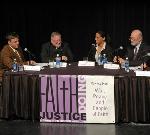Resigned Guantanamo Prosecutor Discusses Moral Crisis, Catholic Faith, and Conclusion That “We Had Abandoned Our American Values and Defiled Our Constitution”
 In a recent interview with the BBC, former Guantanamo prosecutor Lt. Col. Darrel Vandeveld discusses how the conflict he perceived between his military duties and his religious beliefs (as well as his beliefs about the requirements of the United States Constitution) created what the BBC terms a “profound moral crisis,” one that eventually led to his resignation.
In a recent interview with the BBC, former Guantanamo prosecutor Lt. Col. Darrel Vandeveld discusses how the conflict he perceived between his military duties and his religious beliefs (as well as his beliefs about the requirements of the United States Constitution) created what the BBC terms a “profound moral crisis,” one that eventually led to his resignation.
I found it moving to hear another human being discuss his struggle with these issues of conscience so directly, forthrightly, and genuinely. If you want to hear Lt. Col. Vandeveld’s discuss these events in his own words, you can watch this video at the BBC website. The BBC article reports the events this way:
It was one case in particular, that of a young Afghan called Mohammed Jawad, which caused most concern.
Mr Jawad was accused of throwing a grenade at a US military vehicle.
Col Vandeveld says that in a locker he found indisputable evidence that Mr Jawad had been mistreated.
After Mr Jawad had tried to commit suicide by banging his head against a wall at Guantanamo, Col Vandeveld says that psychologists who assisted interrogators advised taking advantage of Mr Jawad’s vulnerability by subjecting him to specialist interrogation techniques known as “fear up”.
He was also placed, Col Vandeveld says, into what was known as the “frequent flyer” programme in which he was moved from cell to cell every few hours, with the aim of preventing him sleeping properly, and securing a confession.
A devout Catholic, Col Vandeveld found himself deeply troubled by what he discovered.

